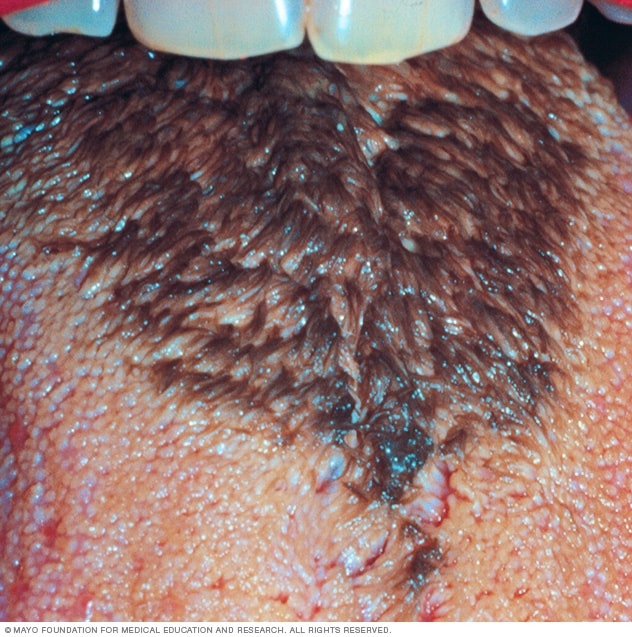Black hairy tongue
Black hairy tongue
overview
Black hairy tongue

Black hairy tongue
Black hairy tongue is caused by an overgrowth of dead skin cells, resulting in elongation of the papillae and discoloration from bacteria, yeast, food, tobacco, or other substances in the mouth.
Black hairy tongue is a temporary, harmless oral condition that gives the tongue a dark, furry appearance. The distinct appearance usually results from a buildup of dead skin cells on the many tiny projections (papillae) on the surface of the tongue that contain taste buds. These papillae, which are longer than normal, can easily be trapped and contaminated by bacteria, yeast, tobacco, food, or other substances.
Although black hairy tongue can look alarming, it usually does not cause any health problems and is usually painless. Black hairy tongue usually resolves by eliminating possible causes or contributing factors and practicing good oral hygiene.
Symptoms
Signs and symptoms of black hairy tongue include:
- Schwarze Verfärbung der Zunge, obwohl die Farbe braun, hellbraun, grün, gelb oder weiß sein kann
- Ein haariges oder pelziges Aussehen der Zunge
- Veränderter Geschmack oder metallischer Geschmack im Mund
- Mundgeruch (Mundgeruch)
- Würge- oder Kitzelgefühl, wenn das Wachstum der Papillen übermäßig ist
When to go to the doctor?
Although unattractive, black hairy tongue is usually a temporary, harmless condition.
See your doctor if:
- Sie sind besorgt über das Aussehen Ihrer Zunge
- Die schwarze Haarzunge bleibt bestehen, obwohl Sie Ihre Zähne und Zunge zweimal täglich putzen
Causes
Black hairy tongue typically occurs when projections on the tongue called papillae become longer because they do not shed dead skin cells like normal. This makes the tongue look hairy. Dirt, bacteria or other organisms can build up on the papillae and cause discoloration.
Although the cause of black hairy tongue cannot always be determined, possible causes or contributing factors include:
- Veränderungen des normalen Bakterien- oder Hefegehalts im Mund nach Anwendung von Antibiotika
- Schlechte Mundhygiene
- Mundtrockenheit (Xerostomie)
- Regelmäßige Anwendung von Mundwässern, die reizende Oxidationsmittel wie Peroxid enthalten
- Tabakkonsum
- Übermäßiger Konsum von Kaffee oder schwarzem Tee
- Übermäßiger Alkoholkonsum
- Essen Sie eine weiche Ernährung, die nicht hilft, abgestorbene Hautzellen von Ihrer Zunge zu reiben
Sources:
- Haarige Zunge. Amerikanische Akademie für orale Medizin. http://www.aaom.com/hairy-tongue. Abgerufen am 25. Februar 2017.
- Gurvits GE, et al. Schwarzes Haarzungensyndrom. Weltzeitschrift für Gastroenterologie. 2014;20:10845.
- Zunge, behaart. Nationale Organisation für seltene Erkrankungen. https://rarediseases.org/rare-diseases/tongue-hairy/. Abgerufen am 25. Februar 2017.
- Goldstein BG, et al. Läsionen im Mund. http://www.uptodate.com/home. Abgerufen am 27. Februar 2017.
- Mangold AR, et al. Erkrankungen der Zunge. Kliniken für Dermatologie. 2016;34:458.
- Zähne putzen. American Dental Association. http://www.mouthhealthy.org/en/az-topics/b/brushing-your-teeth. Abgerufen am 27. Februar 2017.
- Wilkinson JM (Expertenmeinung). Mayo Clinic, Rochester, Minnesota, 16. März 2017.

 Suche
Suche
 Mein Konto
Mein Konto